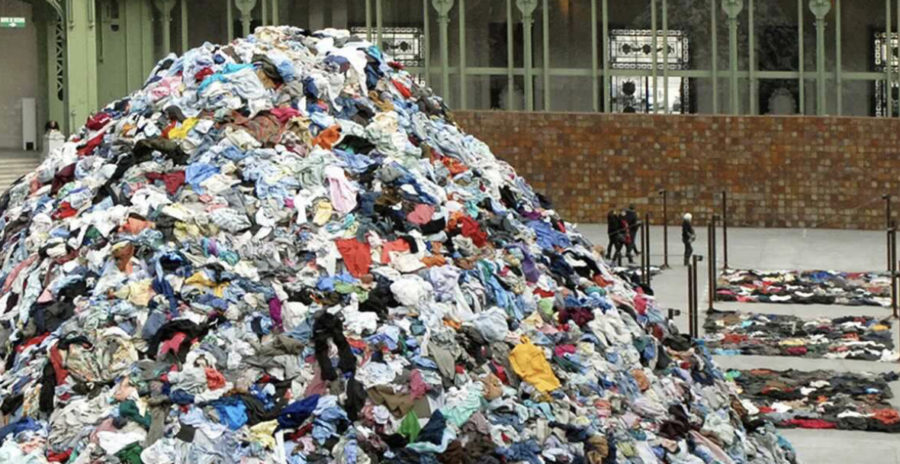Fast Fashion and Labor Laws
Fast fashion tends to result in huge amounts of clothing amassing in dumps and landfills.
June 2, 2023
Cramped, dark, hot, and uncomfortable–Just a few of the conditions that workers around the world are put in all day every day.
Many industries partake in unfair labor laws, especially fast fashion. It is notorious for its factory conditions filled with overworked, underpaid workers. “Fast fashion” is essentially referring to fashion brands that make their clothes, accessories, and other products at a quicker rate than the demand asks, and at a cheaper price. Recently, due to the nature of their labor and production, fast fashion and other industries as a whole has been under fire for unethical labor practices and other similar violations.
Backlash as a whole has been stemming from America, which has a very different set of labor regulations and laws than the countries that fast fashion companies primarily choose. OSHA, FSLA, Income security act, and other policies protect workers’ and worker rights (ex. with strikes and unions) as well as with wages while acting against child labor.
Countries such as Bangladesh are stuck in the Gilded Age with strict policies and laws that essentially put workers in between a rock and a hard place. The International Trade Union Confederation (ITUC) stated that just a few years ago, Bangladeshi workers were protesting their completely unpaid wages at a few clothing factories and were met with fierce violence from police and were shot at, tear gassed, and beaten. Union busting also drastically increased during this time in June 2020. Around 3,000 workers were fired as a result of their involvement in unions. Current standing orders of Bangladeshi labor law conclude that only if someone has a permanent position at a job are they able to join a union. The ITUC denoted that on multiple instances, especially in recent years, thousands of Bangladeshi labor workers were fired due to their membership in hunger strikes.
The ITUC also recently concluded that Bangladesh is number one on the list of the world’s top ten worst countries for workers. It’s accompanied by Brazil, Colombia, Egypt, Honduras, India, Kazakhstan, The Philippines, Turkey, and Zimbabwe.
Due to this lack of a voice certain workers have, they are unable to promote change by themselves. The good news is that plenty of groups are trying to promote sustainability and fair labor practices and give these workers a voice. Good Business Lab is a non-profit labor innovation group that researches labor mainly in India. Work conditions, gender inequalities, wage gaps, and specific worker skills are mainly what they focus on unravelling through polls and general research. In the “Unlocking Female Labor” project, they conducted research on a few factories in Karnataka, India. This project specifically spotlights SRH (Sexual and Reproductive Health) issues that many of these women face. The Good Business Lab’s partner; Shahi Exports, as well as the FPAI (Family Planning Association of India) began holding clinics regarding contraceptives, menstrual hygiene, and other topics pertaining to SRH.
Other groups and companies are also aiming to push for more rights in the labor industry; specifically in fast fashion. The Clean Clothes Campaign was initially founded to bridge the gap between Dutch women and Filipinas. Since then, it has been in motion for about 3 decades. They essentially tackle both individual and collective labor grievances. Using their Urgent Appeal system, workers can end their specific labor rights violations. They’ve secured compensation for workers after workplace disasters such as the Ali Enterprises disaster and have pushed many companies such as H&M to commit to paying their workers living wages. Currently, they are urging for corporate supply chain transparency with their Transparency Pledge as well as their GSF (Global Strategic Framework) plan that will be in motion until 2026.
Brands have also begun to form that focus on avoiding drastic carbon emissions and making sure that their factories are located in areas with strict regulations. Clothing brands like Reformation keep their main factories in Los Angeles, where regulations are strict. They also use less water and carbon in their production process and submit yearly reports to keep their transparency open to consumers. Reformation and many other brands similar are present on the app “Good on You” which aims to compile a list of ethical alternatives to unsustainable brands that are behind in reducing carbon emissions and maintaining safe and productive factory/labor environments.
As mentioned above, with fast fashion creating goods at a greater rate than the consumer is asking, overproduction and surplus are at an all-time high. Mrs. Pilkenton (S) explained that, “When we purchase more clothes, we think that if we give away out old clothes, they will be reused. But the company ‘For days’ states that 85% of our clothing ends up in landfills rather than stores like Goodwill.”
This has evidently been affecting the environment greatly. Princeton University, a few years ago, concluded that the fashion industry is one of the leading producers of carbon emissions, surpassing international flights and maritime shipments. The fashion industry also uses an excessive amount of water in the process of production reaching around 3 thousand liters per t-shirt on average. Also as mentioned before, many fashion companies place their factories in countries with loose regulations, leading to environmental damage such as dumping excess factory water into the ocean. The consumption of clothing is increasing drastically as fast fashion companies create more and more clothes that people keep for short amounts of time and ultimately dump. Clothes either pile up or are incinerated; both are detrimental to the environment and to the people living around the emissions created as a result.
TRAID, an organization based in the U.K. aims to repurpose mass amounts of clothing in order to avoid them being dumped in some way. Greenpeace, a similar organization, uses advocacy to urge companies to change their use of harmful chemicals. The brand Clorox has used Greenpeace’s methods and proven that being sustainable with chemical usage in production can ultimately aid the company in profits and production costs. Many other companies such as Adidas and Nike have heard Greenpeace out and are taking their advocacy into consideration with company policies.




































Isabelle Gregg • Nov 30, 2023 at 7:40 AM
This is so well written and eye-opening to realize how harmful fast fashion can be!
Imaan Moten • Oct 12, 2023 at 7:33 AM
this is so insightful! Fast fashion is very concerning for our environment